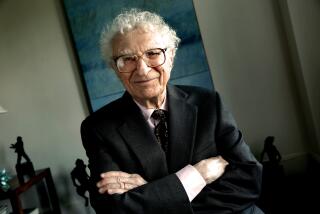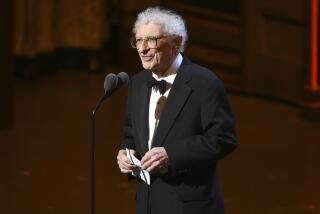Harry Connick Jr. Takes Inventory : Big band: The pianist and singer, who appears tonight in Irvine, draws his influences from a slew of musicians. Just don’t compare him to Sinatra.
- Share via
Don’t talk to Harry Connick Jr. about Frank Sinatra. And, above all, forget the comparisons. He’s heard them too often.
So despite the fact that he’s a slender, good-looking young guy with a crooner-like voice who makes both the young and the young at heart (pun intended) swoon, Connick can do without the Sinatra remarks.
But mention Dick Haymes and it’s a different story.
“I listen to Dick Haymes more than anybody,” Connick says. Excuse me? Dick Haymes ?! The ‘40s crooner who once rivaled both Sinatra and Bing Crosby in popularity?
“I love his voice. And Vic Damone and Steve Lawrence and all those dudes. I love their stuff too. But Dick Haymes is just unreal.”
Since Connick, who appears at the Pacific Amphitheatre tonight is not particularly known as a satirist, his comments have to be taken on face value. And, listening to his singing, one can hear in Connick’s chest tones a striking resemblance to Haymes’ breathy, resonant baritone.
But Steve Lawrence? Hmmm.
Regardless of influences, the 24-year-old New Orleans native has become one of the hottest talents in the entertainment business. As a matter of fact, you really know you’re in the Sandwich Generation when both your parents and your kids ask for gift tickets to Connick’s concerts.
Tonight’s program is close to the start of a nationwide tour that will continue until Connick returns to Southern California in mid-September for a four day wrap-up at the Universal Amphitheatre. Earlier this year, he toured Australia; in late March, he did a sold-out 15-date engagement at New York City’s venerable Paramount Theatre, with some of the shows filmed for a telecast later this year. His “Blue Light, Red Light” album, released last fall, has already been certified platinum.
In his spare moments, Connick appeared in “Little Man Tate” with Jodie Foster, performed on one of Johnny Carson’s final “Tonight Show” episodes and did a guest shot on “Cheers” as a lovesick musician with a crush on Rebecca Howe (Kirstie Alley).
Busy? Most people would say so. But Connick, whose laid-back manner reminds you that his surname rhymes with “laconic,” doesn’t see it that way.
“I don’t do that much,” he said. “Whenever anybody talks about the things I do, they put them all in one sentence--acting, touring, singing, playing. But if you break it down, I’m not acting now, I’m not doing any soundtracks. All I’m doing is playing with my big band on tour. When the tour ends, maybe I’ll do another record, maybe I’ll do another tour, maybe I’ll act. So I’m not really doing any more than anyone else is.”
Given the steamroller success of Connick’s career, it’s probably not surprising that he seems to take things so casually. He’s already had more accomplishments than many veteran performers can claim for an entire career.
There are those, of course, who believe that Connick’s meteoric rise was not casual at all, but the result of one of the best merchandising game plans in recent pop-music history.
“The packaging of Harry Connick was vital to his success,” suggests Ricky Shultz, head of jazz and progressive music at Warner Bros. Records, a competitor of Connick’s label, Columbia. “It was an extremely well-conceived marketing plan.
“There were a few radio programmers who were very skeptical because they thought Connick wasn’t the sound of their stations,” Shultz said. “And the truth is that, in the beginning, he didn’t get that much airplay. But they couldn’t deny the fact that there was something really happening with the guy. Then, when the marketing campaign kicked in--getting his picture in fashion magazines, developing a celebrity persona, touring, playing the Sinatra teen-idol image to the hilt--it all opened the door.”
Despite the heavy-hitter game plan, Connick was not new to public performing. At the age of 6, he played piano well enough to appear at his father’s swearing-in ceremony as district attorney of New Orleans (a job he still holds). By the time he was 10, Connick had made his recording debut with a local traditional jazz band. His teachers--jazz patriarch Ellis Marsalis and rhythm and blues master James Booker--are among the most distinguished Crescent City musical names.
“Studying with James Booker,” Connick said, “that was like somebody taking you off the Earth and putting you in Heaven. He was a friend of my father’s, and I knew him from the time I was 8 years old. He was like the only genius, musically, I’ve ever known. He really invented things--ways of playing the piano--that are almost physically impossible to do. He would sit down and play for hours; when I was lucky, I’d get to play with him.”
Connick moved to New York when he was 18, worked in Manhattan clubs and briefly served as organist and choir director for a Bronx church. As he was about to embark on an educational course at the Manhattan School of Music, however, he was signed by Columbia Records and stepped onto the fast track to stardom.
His first album was intentionally done as an all-instrumental effort. “People don’t think I’ve been singing all my life, because I didn’t do it on my first record,” Connick said. “But I knew the singing was gonna get more popular, so I wanted to make sure everybody knew I was a piano player. If I’d released a vocal album first, nobody would have taken my piano playing seriously.”
Connick handles his high visibility with an unpredictable mixture of grace, detachment, humor, annoyance and occasional youthful arrogance. He’s been interviewed often enough to know the techniques of avoidance extremely well.
Ask about his image as a retro-pop star and the answers get short. “There is no image,” he says, impatiently. “Somebody takes a picture of me, there’s no image, it’s just a picture.”
Ask about his mother (who died when he was 13) and the responses become monosyllabic. Ask about his girlfriend, Victoria’s Secret catalogue model Jill Goodacre, and Connick becomes very quiet, indeed.
He is far more accessible to conversations about music. Queried about his remarkable feat of both composing and arranging all the songs for his current album, Connick laughed and said, “You know, no one’s ever asked me about my arranging before.
“Funny thing is that I never was much influenced by arrangers, for some reason. But I love people like Ellington so much that I’m sure what I know about him comes out at some point in my arranging. But I didn’t intend to do that. . . . As opposed to when I was playing piano and singing a few years back, and I would try consciously to sound like performers I admired--just like every young musician does.”
And he is not unwilling to talk about his interest in acting. The scene in “Little Man Tate” in which Connick appears in bed with a woman, for example, is recalled with a surprising degree of prudishness.
“I had some reservations about the scene in bed,” he said, “but you learn about yourself as you grow up. And I didn’t feel that was right for me. I don’t regret doing it, but I won’t do something like that again. Everybody has their own personal limits.”
What he will do is keep an open eye for the right film vehicle. “It will have to be something that would be right for me,” explains Connick. “I’d like to play something kind of close to myself. I haven’t had much experience in acting, and Jodie Foster taught me it’s a lot easier to play something close to yourself than to develop a completely foreign character.”
Which brings matters back to Frank Sinatra, who also started out in films playing characters close to himself.
Despite his impatience with the comparison, Connick clearly realizes that Sinatra is a far more promising model for a world-class career in show business than is Dick Haymes or, for that matter, Steve Lawrence. In a relatively unguarded moment, he confirms the identification by concluding the conversation with a remark that resonates closely to Sinatra’s tongue-in-cheek description of himself as simply “a saloon singer.”
“I’m just a piano player and a singer,” Connick said. “That’s what I do. That’s all of it.”
* Harry Connick Jr. sings tonight at 8 at the Pacific Amphitheatre, 88 Fair Drive, Costa Mesa. $22.55 to $35.75. (714) 740-2000 (Ticketmaster).
More to Read
The biggest entertainment stories
Get our big stories about Hollywood, film, television, music, arts, culture and more right in your inbox as soon as they publish.
You may occasionally receive promotional content from the Los Angeles Times.










